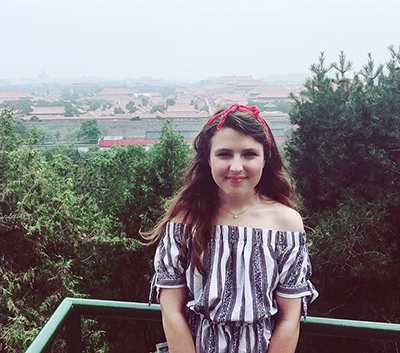My Summer Language-Intensive Program

Since I was little, I have always wanted to study abroad; however, I worried about funding and not being able to get proper accommodations for my disability while studying. In high school, I hated when I felt like my disability was holding me back. I feel like, especially in public schools, dyslexia can be swept under the rug, meaning I was often left behind or missing out, and we couldn’t afford extra tutors or English lessons. When I entered high school, I chose a small public arts school called The Center School. I had a teacher who was passionate about teaching me, and I didn’t feel ashamed when writing papers. I finally accomplished that growth and support I needed. When I graduated from high school two years ago, I was excited that I possibly could study abroad and keep up with my studies.
This summer, I went to Beijing to study Mandarin. I had to save a lot of money, and learn a lot about budgeting and saving money, which I highly recommend to everyone. Every day, I went to classes in the morning and then toured at night. My classes were filled with people from all over the world, and I wasn’t only growing a deeper understanding of Chinese culture but Indian, Korean, Russian, and Tanzanian cultures as well. I got to challenge my definition of what it meant to be a global citizen and asked myself how I could be better.
Studying abroad broadens your community and allows you to learn through experience. Traveling and getting to know others allows you to develop a stronger social understanding of the global community while exploring your own personal growth. Kindness overcomes language barriers. For example, two strangers, who didn’t speak English, used their daily commute to help me write better Chinese characters. From these situations I learned the value of movement, tone, and body language in conversations. I developed deep relationships with people who didn’t speak the same language.
I also learned the privileges of having a good sewer system and traffic lights. Some days it would be over 80 degrees with pouring rain, and puddles would build up without drainage. I would walk in water up to my ankles to get to class. In Beijing, there weren’t many traffic signals. I was often scared to cross the street, but I learned how to be aggressive and walk with a group of people.
Being disabled can make people feel isolated, just like members of other groups and cultures within our country and community. We should all learn about different cultures, as well as about disability and different minority groups. It would be great if more information was provided in high school, or more language and culture classes were offered at the library or community colleges.
I feel lucky to live in Seattle, where I have so many opportunities for knowledge and diversity. I challenge everyone reading this to try to grow to be a better global citizen by reaching out, doing something new, and widen your own community. Also, challenge yourself to interact with different people in your daily life, share knowledge, experience different media options and learn stories that are from other perspectives.